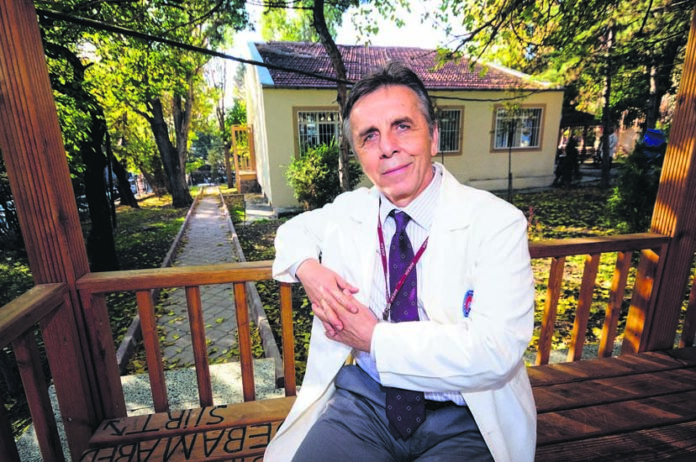by Professor Erol Göka
Sep 22, 2016 | Newspaper Article , Psychiatry-Psychology |
We need to reflect on the issue of Europe and Turks, whether within the framework of EU membership negotiations or not. The rising Islamophobia and racism in Europe obliges us to think about why this is happening and how we can live together from now on. My brother İbrahim Kalın’s magnificent work “Me, the Other and Beyond” can be instrumental in this.
When you finish the book, the following statement about what needs to be done in the last paragraph will ring in your ears:
“Humanity has many possibilities for a more just and peaceful world order. For this, we need to learn to live with people who are different from us, within the framework of certain moral principles. Being at peace with the ‘other’ depends on being at peace with ourselves. When Islamic and Western societies act with this historical sense of responsibility, they will have the opportunity to make a great contribution to world peace.”
In the same book, what is written about historical reality also whispers how difficult this task is. Because you can clearly see that the West’s hostility towards Islam and Muslims is deep-rooted, and racism was not discovered by westerners in Europe out of nowhere:
“It is not possible to separate Islamophobia from ethnic and racial hatred against Arabs, Asians and blacks.”
Europe’s multiculturalism, coexistence, tolerance etc. In order to maintain its claim to be European under slogans such as these, it has to confront its colonial, historical and Eurocentric, racist past very, very seriously, and never let go. Europeans are full of so many prejudices about Muslims and especially Turks, passed down through generations and stuck to their identities.
“Muslims, which were expressed with the words ‘Sarasen’ in the Middle Ages and ‘Moor’ in Andalusia, are increasingly identified with the ‘Turk’ type since the 16th century. Europe never forgave the Turks after the conquest of Istanbul,” says İbrahim Kalın and quotes the following words of Pope II. Pius:
“In the past, we have been injured in Asia and Africa, that is, in foreign countries. But this time we are being attacked in our own land, in our own home, in Europe. True, the Turks crossed into Greece from Anatolia a long time ago; The Mongols came to Europe and the Arabs captured certain parts of Spain via the Strait of Jebel-i Tarık. But we have not lost any city or position that can be compared to Constantinople.”
The terrifying Turkish perception based on fear that emerged after the conquest of Istanbul causes Europeans to hope for help even from Tamerlane and Mongols. Tamerlane turns into a hero who takes revenge on the Turks in the name of Europe and Christianity. Renaissance humanism does nothing to soften the barbarian perception of the Turks, on the contrary, it increases it.
İbrahim Kalın gives examples of the negative Ottoman-Turkish image that “appears in almost every area of Europe, whether in politics, religion or theatre. After the decline of the Ottoman Empire, this perception began to be fed by “orientalism” based on contempt contempt. The European world of thought also gets its share from this perspective.
“The habit of basing everything that is seen as good and beautiful in Islam somehow on pre-Islamic and non-Islamic sources begins”.
Leibniz, Herder, Hegel,even Kant and even Marx do not hesitate to use condescending statements about Islam and Turks that are not based on research and sound knowledge. As the Ottoman Empire weakens, this negative sentiment culminates.
The following words of Andre Gide, winner of the 1947 Nobel Prize in Literature, after visiting Istanbul and Konya in 1914, are too clear to leave room for discussion:
“Constantinople (Istanbul) confirms all my prejudices and is included in my personal hell along with Venice. When you start to appreciate an architectural work, the façade of a mosque, you learn (just as you suspect) that it is Albanian or Iranian. Turkish clothes are the ugliest clothes you can think of; To tell you the truth, the Turkish race deserves it too… Now I see that our Western (I was about to say French) civilization is not only beautiful, but I believe it is also the only civilization—that Greek civilization that only we inherited.”
This prejudiced attitude that envelops even Gide is almost the same today. As required by the context of his book, İbrahim Kalın deals with the problem only within the framework of Islam-Western relations. The rapid development against Christianity during the emergence and spread of Islam is undoubtedly very influential in the origin and violence of Islamophobia.
But I’m afraid Europe’s prejudices against Turks are not just limited to being against Islam, they are much older and have become an integral part of their identity. Let’s continue hopefully…




















